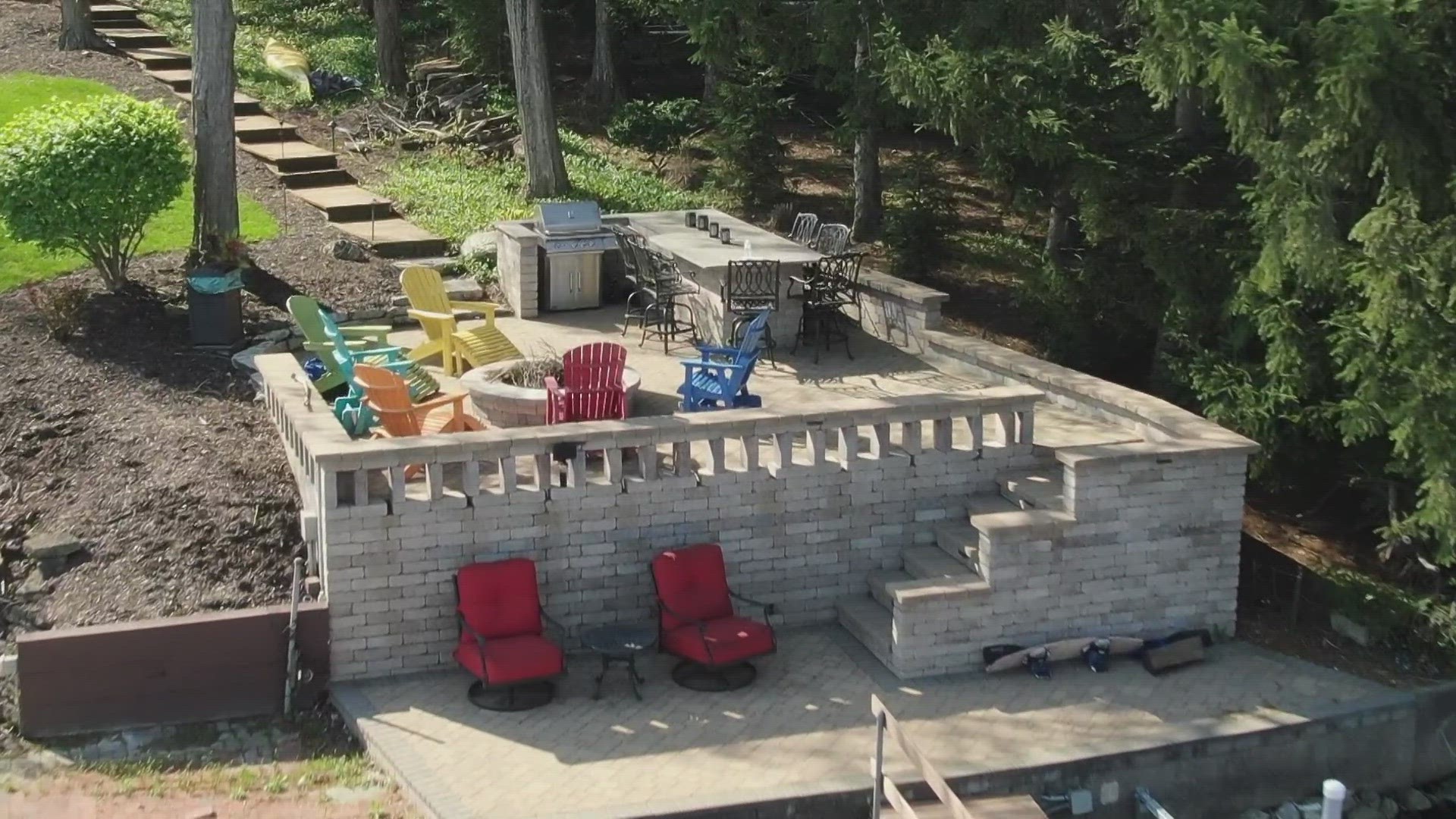INDIANAPOLIS — Kim and Ray Peck have quite a view from their backyard. For the past 19 years, the Indianapolis couple has lived in a home that sits along Geist Reservoir.
“We’ve always wanted to live on the lake,” Kim told 13News. “It’s just so relaxing to be out here.”
But relaxing is not how the Pecks describe their lengthy legal fight with the City of Indianapolis – a fight that focuses on their backyard patio.
“It’s hard to even enjoy it because you’re thinking at any moment, someone’s gonna say ‘You have to rip this out,'” Kim said.
“It has easily been the worst experience of our lives,” added Ray.
The legal battle between the Pecks and the City of Indianapolis involves a zoning rule that few people know about. Legal experts say that rule impacts thousands of other homeowners across Indiana’s largest city and, if enforced, could cost other families thousands of dollars in fines and legal bills.

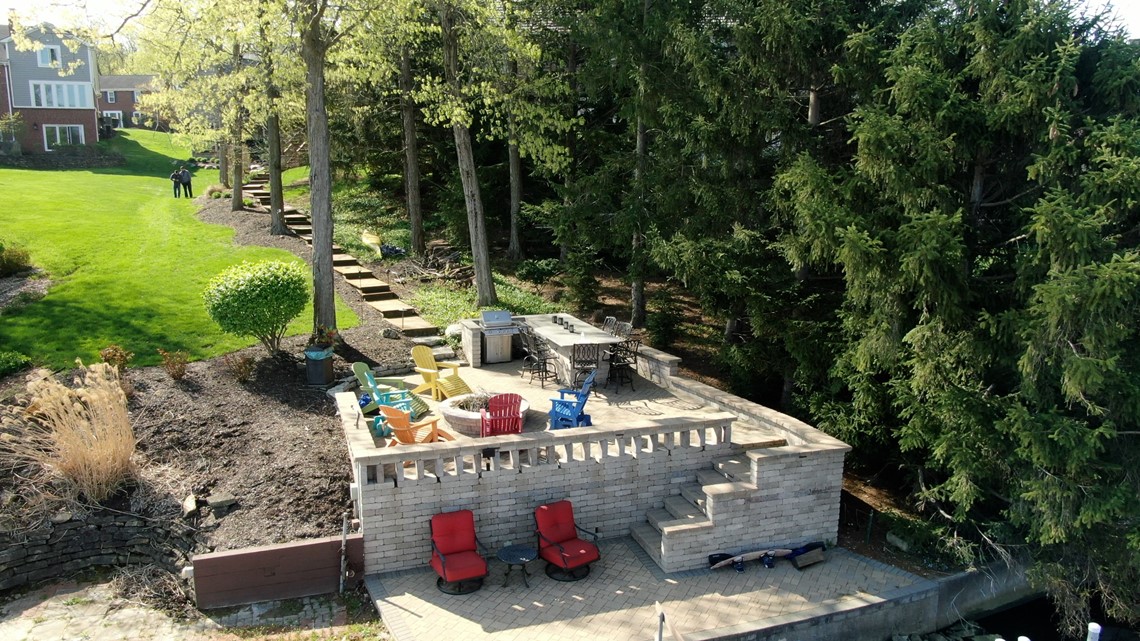
Stop orders issued after patio already completed
The Pecks renovated an existing backyard patio in 2017, expanding it to host family events and their daughters’ Girl Scout gatherings.
City records show a neighbor contacted the city during construction, alleging the patio was being built without proper permits and was encroaching on his property.
“Next thing we know, we had an inspector show up,” Kim said. “Do we need any permits? Is there any violation? [The inspector] says ‘No, everything looks great. Keep going.’ So the builders kept going. We had three inspectors from the city come out and every one of them said, ‘You’re good to go.’”

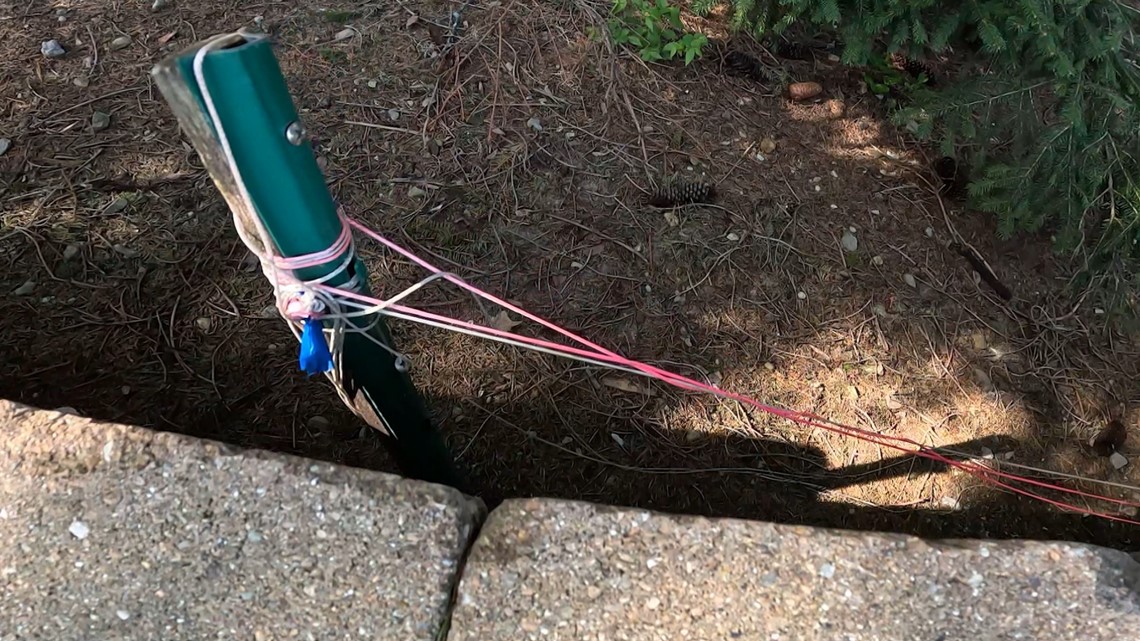
The Peck's neighborhood homeowner's association approved the patio renovation plans on July 17, 2017, with the requirement that necessary permits be obtained prior to construction. By that point, the renovation was complete.
Kim and Ray say six weeks after they finished the renovation, another city building inspector returned on July 31, 2017, with three stop work orders claiming the Pecks failed to get multiple permits required for the patio.
According to the city’s Department of Business and Neighborhood Services, the patio renovation needed an electrical permit, a structural permit and an improvement location permit. The Pecks had not obtained any of those prior to construction because neither they nor their builder believed the permits were necessary.

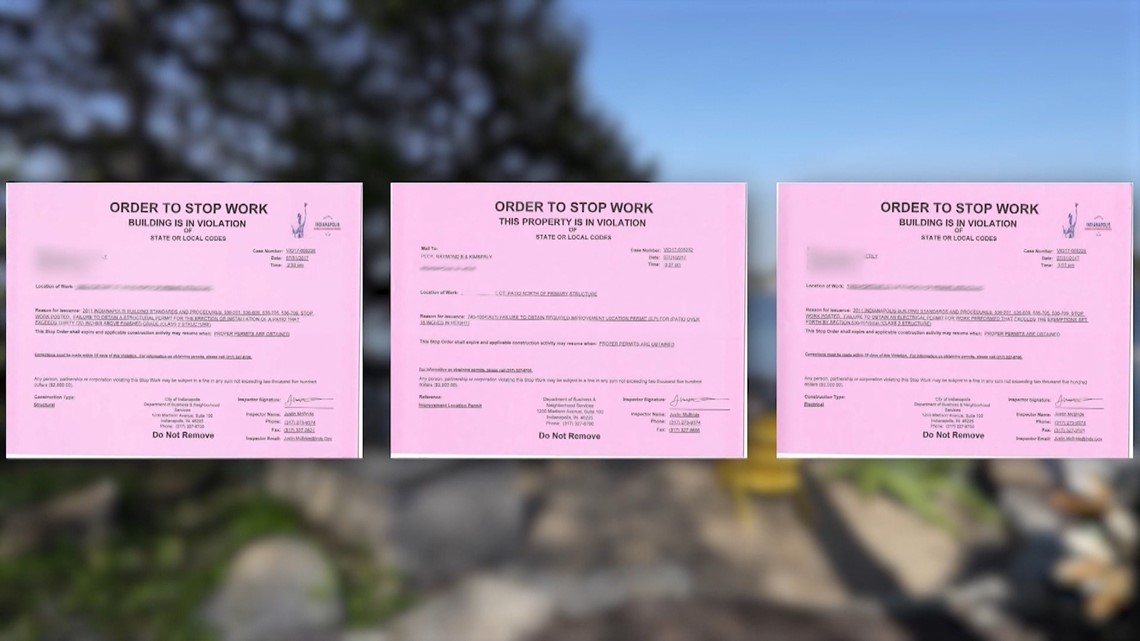
Kevin Schluchter, president of Cutting Edge Hardscapes, told 13 Investigates the renovation involved “a seemingly very insignificant update of their older multi-level patio that was set in the same location,” and city inspectors never indicated a permit was required while the patio was under construction.
“During the initial stages of demolition, inspectors came out to the jobsite, looked at the drawings, walked the property and jobsite location and left without placing a stop work order,” Schluchter wrote in a statement to 13News. “What has happened was very unfortunate.”
But the city claims inspectors did inform the Pecks that their renovated deck was not considered a simple “like-for-like” project that would be exempt from permitting requirements. And the city argues the Peck's patio project was far from an "insignificant update." The nearly $70,000 renovation included the replacement of drainage pipes and paver stones, installation of a built-in counter, rebuilding of the existing retaining wall and the addition of electrical service.
Nearly six years later, the two sides are still embroiled in ongoing litigation over the patio. The city filed a lawsuit against the Pecks, claiming they violated six city zoning laws. Between legal bills and potential fines, the family says the dispute has been very costly.
“We have spent over $240,000 defending this, and all we did was rebuild our patio on our own property,” Ray told 13 Investigates. “We thought we could depend on the word of the building inspectors who told us, 'No, you don’t need [permits],' and here we are six years later. This has been a disaster for our family.”
While the Pecks insist they did nothing wrong and were simply following the early guidance of city inspectors, they recently suffered a legal setback.
When a patio is more than a patio

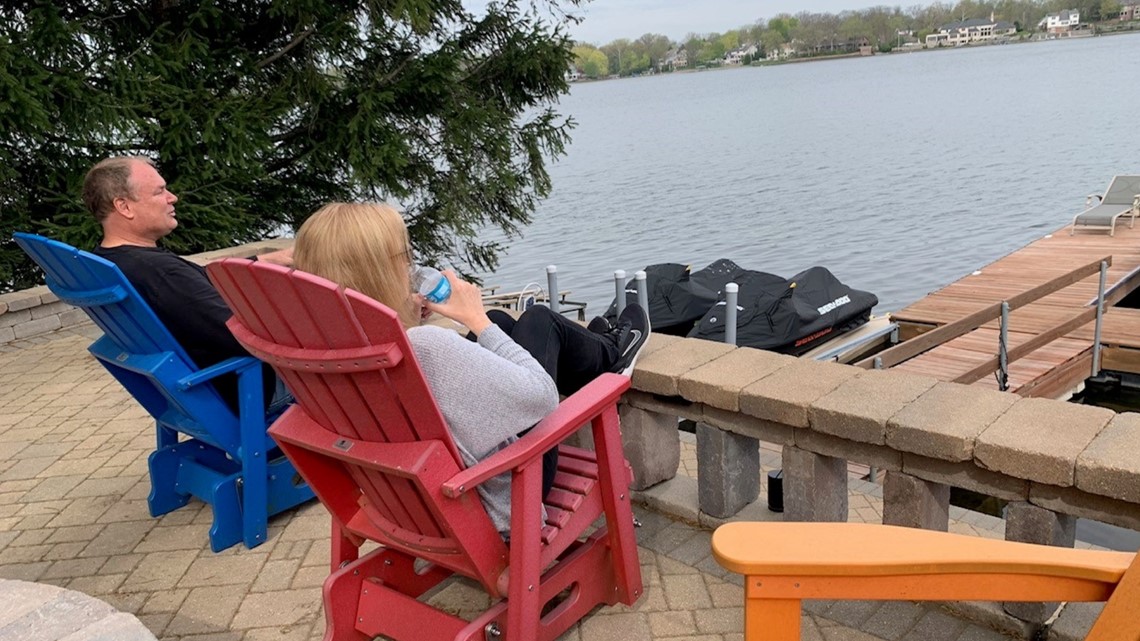
Last year, city attorneys filed a request for summary judgement in their lawsuit against the Pecks. A Marion County Superior Court magistrate ruled against the Pecks in December, granting the city’s request on four of the six counts included in the lawsuit.
Magistrate Travis Sandifur rejected the city’s claims that the Peck family needed a structural permit to renovate their patio and that they ignored stop work orders that an inspector issued during construction. He said there was “no proof” those orders were ever served.
But Sandifur ruled the Pecks did violate city code by failing to obtain a drainage permit, an electrical permit and an improvement location permit. In a very detailed 44-page ruling, the magistrate said the city has every right to enforce a little-known rule in the city’s zoning code that addresses what’s called a “minor residential structure.”
Indianapolis Revised Code 740-202 defines minor residential structures as “Structures that are subordinate and secondary to the primary residential use of a property, such as garages, carports, porches, decks or patios 18 inches or greater in height, mini-barns, sheds, workshops, swimming pools, hot tubs, porte-cocheres, bathhouses, cabanas, secondary dwelling unit, shelters for personal livestock, greenhouses, and other accessory buildings or structures similar and comparable in character to these uses.”
In his ruling, Sandifur wrote, “patios greater than 18 inches in height are unambiguously designated as minor residential structures” that are subject to city permit requirements, and the 18 inches includes “all parts of the structure.”

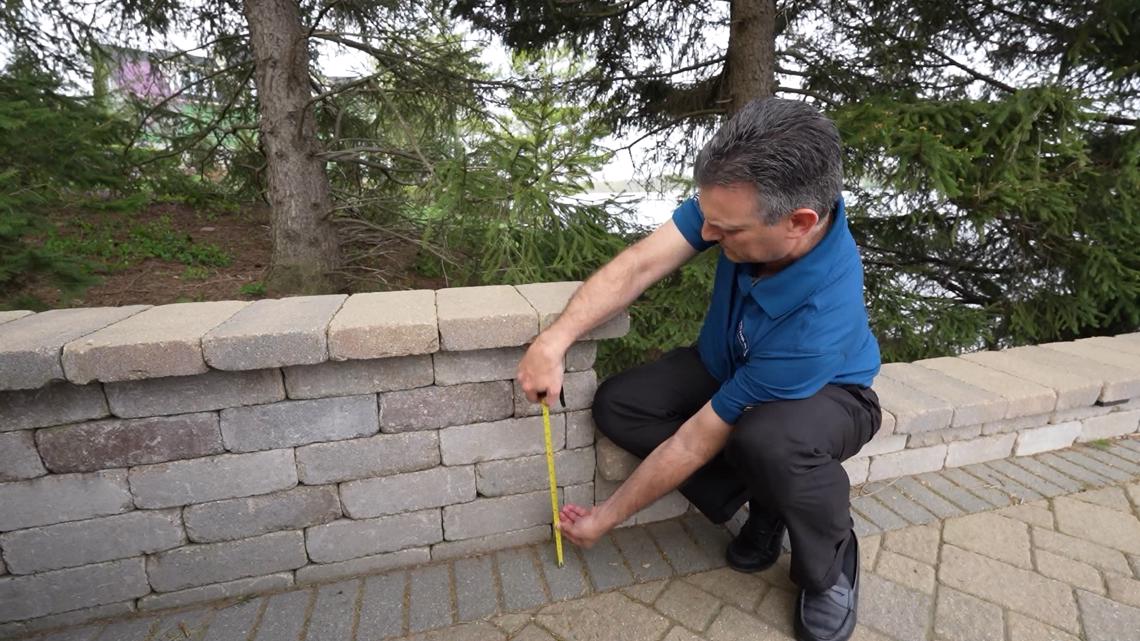
It means the Pecks' backyard patio required an improvement location permit because the retaining walls and a built-in countertop on the renovated patio are more than a foot-and-a-half off the ground.
Residents across Indianapolis should take note of the court’s ruling – and the city’s enforcement action – involving minor residential structures, according to attorney Peter Kovacs.
“If the city decides to take a more aggressive stance on structures like this, it certainly should cause a lot of people concern because they might have existing structures that they didn’t get permits for that they should have,” said Kovacs, who specializes in laws that affect homeowners.
He told 13News the magistrate’s superior court ruling likely will not set significant legal precedent since it has not yet been considered by a higher court. But Kovacs said the zoning ordinance the city is enforcing in the Peck’s Geist neighborhood could mean big trouble for other families who live in other parts of the city, as well. To understand why, just look in the backyards of nearly any neighborhood in Indianapolis, where it is now common to see remodeled decks and patios with fire pits, trellises, sitting walls and other features that are more than 18 inches high.

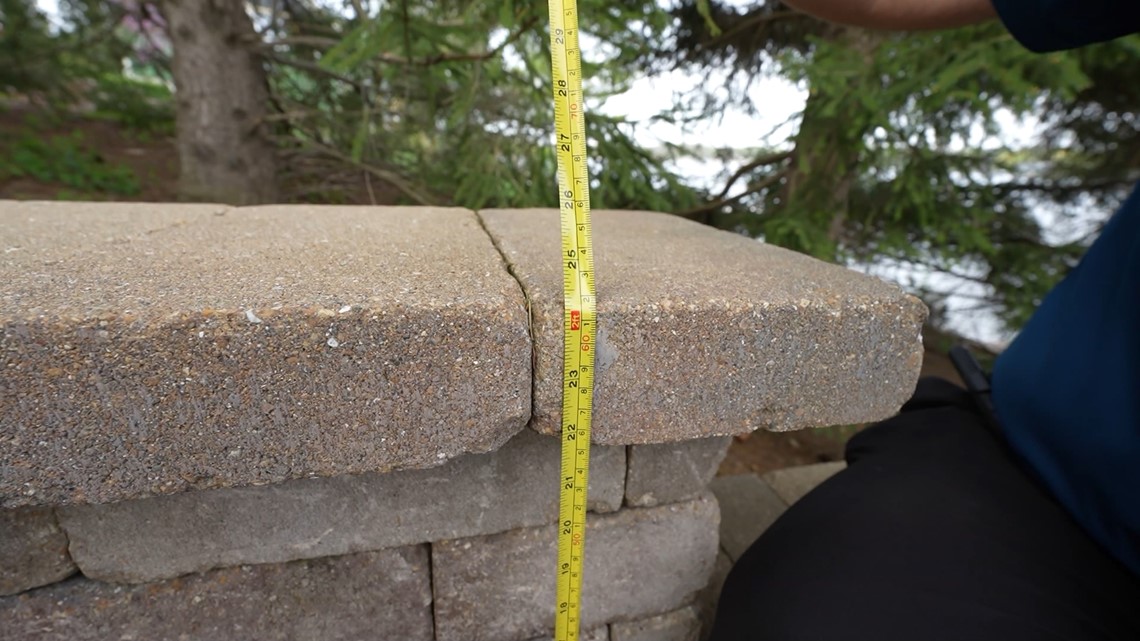
“It’s a cautionary tale of what could happen if you don’t take that step to get a permit, said Kovacs, pointing out that many homeowners and homeowners associations are not familiar with the city’s minor residential structure rule. “I can’t imagine that they would be, and this is why this case should be of concern to them. If you are building a patio or deck and any part of it extends up more than 18 inches, that could trigger the requirement to get a permit.”
The Pecks also worry that other unsuspecting homeowners in Indianapolis might be subject to inspection and fines by the city. And because their patio has been declared a minor residential structure by the city, that triggered another zoning restriction that requires the patio to be set back at least eight feet from each side property line. Like their original patio, the Peck’s renovated patio extends the entire 25-foot width of the family’s backyard. The city says they have therefore violated city zoning standards (the magistrate agreed), and the family might therefore have to tear out more than half of the patio to comply with the rules.
“The patio is fully on our property. It was approved by our HOA. It just defies common sense that the city is prosecuting us for this, and there are times you just have to sit back and say, ‘Why is this happening?’” Ray said. “This will impact a lot of people. This will impact everybody.”
No simple answers
13 Investigates asked the Department of Business and Neighborhood Services if its inspectors are now actively looking for permit violations on decks and patios that are higher than 18 inches.
“There is not a proactive enforcement team that is intentionally looking for things of that nature,” replied BNS deputy director Amy Wunder.
If the city is not proactively enforcing its minor residential structure rule, why are inspectors enforcing it against the Peck family? Wunder said enforcement decisions are specific to ordinance requirements but also said she could not discuss specifics about the Peck case.
“There is still ongoing litigation with the particular case that you’re referencing, and at this time I would not be able to comment on that,” Wunder said, explaining that city attorneys have advised against speaking to the media about a pending case.

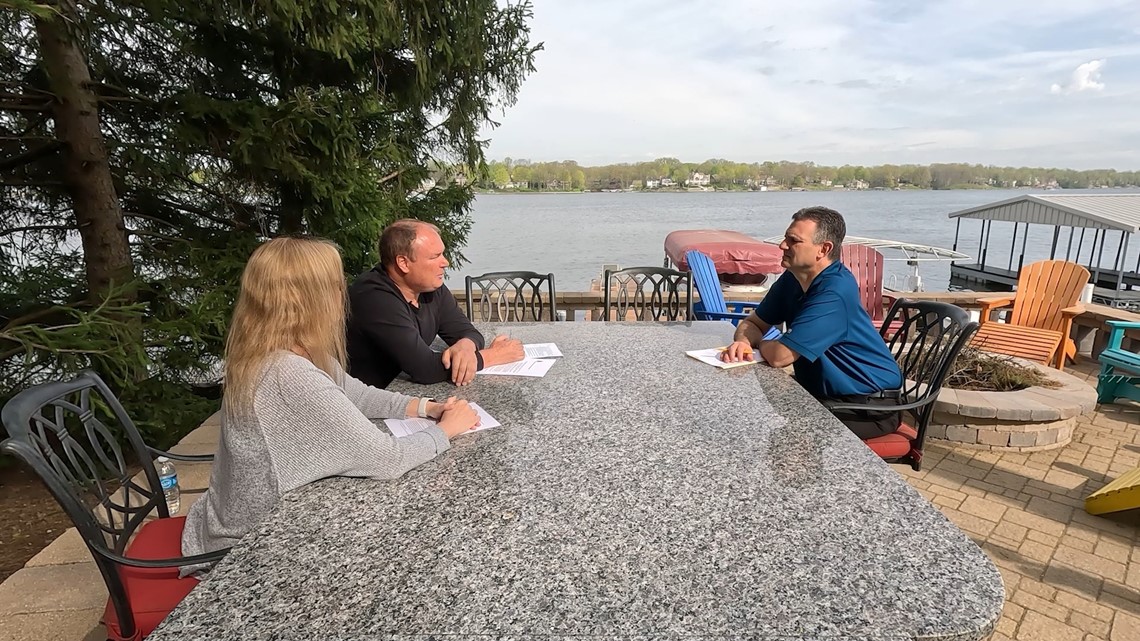
Wunder was willing to speak with 13News about general zoning rules and procedures, but when asked more detailed questions that homeowners might pose when building or renovating a patio or deck, she hesitated to provide definitive answers.
13News: When do folks need a permit and when do they not need a permit?
Wunder: That’s a very good question. It’s one we get often. Unfortunately there’s not a clear “this or that” answer… it just depends a little bit on the type of improvement that’s proposed, but we’re happy to help folks navigate that process as often as we can.
13News: If someone has a fence or a wall or a trellis that’s built onto their deck, would what need a permit?
Wunder: So I’ll have to give you the same answer I would give an applicant if they were to call us today and ask that question. It would really depend on the scope of their project that is identified on their plans.
13News: What about a fire pit that’s built in as part of a deck?
Wunder: I think that’s hard to answer. I think that depends on the nature of that improvement and, again, we’d need to see the plans to be able to make that determination.
The city charges a fee to conduct a formal plan review. A basic plan review costs $85 -- more expensive for larger projects – and takes about ten business days to complete, according to BNS. There’s also a fee for each required permit.
As Wunder’s responses suggest, figuring out whether a plan review or permit is needed is not easy. The city’s Building Standards and Procedures document is 117 pages, and if homeowners want to review the Indianapolis Building & Construction ordinance, that is another 42 pages.
The Department of Business and Neighborhood Services does post lots of information on its website, as well a Homeowner’s Building Permit Guide, but those resources are unlikely to answer all of the specific questions that homeowners may have if building or renovating a deck or patio.
So what should you do if unsure whether a permit is required?
“When in doubt, apply for a permit, and we’re happy to help you navigate the process,” Wunder said.
“If you are planning to build a structure and any part of it is 18 inches or more off the ground, you probably need a permit or you could have problems down the line,” agreed Kovacs. “When you contact the city to determine whether a permit is needed, get that in writing.”


The Pecks have learned that lesson the hard way, and there's still no resolution in sight for their six-year legal battle with the city.
Kim and Ray have requested a variance to keep their existing patio. It is unclear whether BNS and the Department of Metropolitan Development will support that request without mandating significant changes to bring the deck into compliance with city building codes.
“We’ve been through six years of hell and expense and it has controlled our lives,” Ray said. “We’re trying to be good neighbors and do the right thing. We just want to move on and get our lives back.”
The Department of Business and Neighborhood Services posts permitting information and a Homeowner’s Building Permit Guide on its website. While those resources are unlikely to answer all of the specific questions homeowners might have when building or renovating a deck or patio, they do include general information as well as contact information to reach BNS staff.
For questions about residential permits, Indianapolis residents can contact 317-327-8700 or permitquestions@indy.gov.
(Editor's note: This story has been updated to reflect that the Pecks received conditional approval from their HOA for their patio renovation after construction was completed. A previous version of the story incorrectly reported they had received the approval prior to the project. The report was also updated with information that the Department of Business and Neighborhood Services emailed to 13News after publication to provide additional context.)

